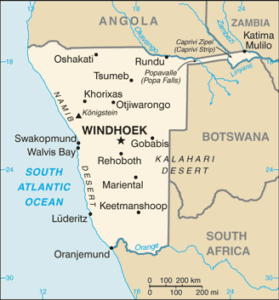 Often times when my readers discover that I am from Namibia I get questions such as, Namibia? Where on earth is that!
Often times when my readers discover that I am from Namibia I get questions such as, Namibia? Where on earth is that!
Namibia is on the west coast of Africa, bordered by South Africa in the south, Botswana in the east, Angola and Zambia in the north and the Atlantic Ocean in the west.
The country has a population of 2.4 million people and is 825,419 square kilometres (318,696 square miles).
Namibia is a former German colony known as German South West Africa. The country became independent on March 21, 1990. German is still spoken widely and much of the German heritage is still visible in the architecture and culture. The capital of Namibia is Windhoek which is situated more less right in the middle of the country in the Khomas Hochland Mountains.
Namibia got its name from the Namib Desert on the west side of the country, the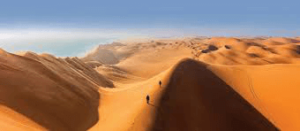 oldest desert in the world.
oldest desert in the world.
Growing up in this semi-arid land was a unique and special experience.
We lived on a farm on the eastern side of Namibia in a region called the Kalahari Desert. Despite the images of desolate wastelands and savannah that may appear in one’s mind when hearing the word desert, we had a childhood filled with beauty and nature. Our farm was 10,000 hectares (24,710 acres).
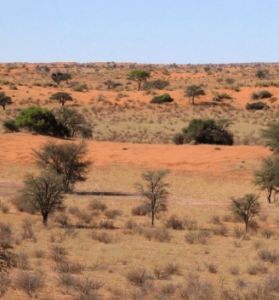 We farmed with sheep, goats, and cattle. But the most exciting was the wide variety of wild animals.
We farmed with sheep, goats, and cattle. But the most exciting was the wide variety of wild animals.
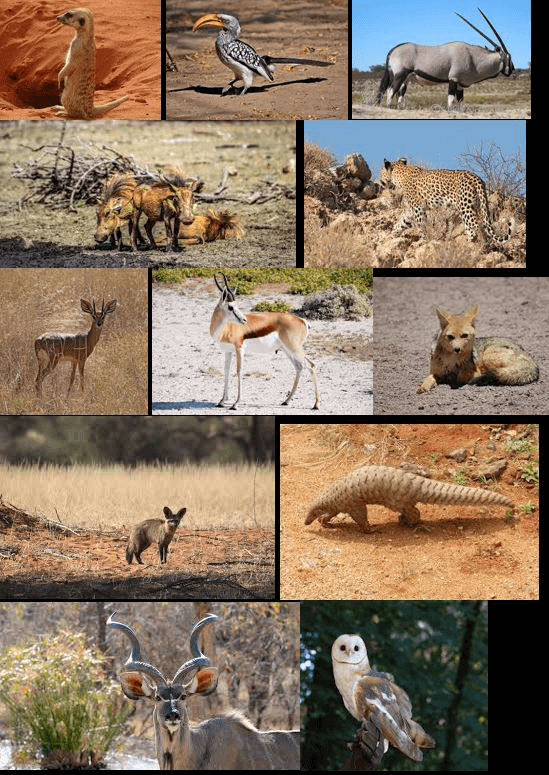 Often times my brother and I would be on horseback and we would help my father check on the animals, mend fences, and rescue any orphaned animals.
Often times my brother and I would be on horseback and we would help my father check on the animals, mend fences, and rescue any orphaned animals.
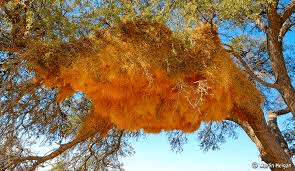 Pictured here is the weaver bird nest, a common feature on the farm, weaver birds make giant nests and live in a small city of broken twigs and any other items they have found to make their nest comfortable with. A nest can be home to up to 400 weaver birds.
Pictured here is the weaver bird nest, a common feature on the farm, weaver birds make giant nests and live in a small city of broken twigs and any other items they have found to make their nest comfortable with. A nest can be home to up to 400 weaver birds.
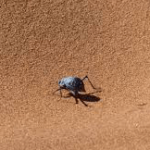 One of my favorites was a little beetle which we called “toktokkie”. These little beetles spend their lives in search of a mate by tapping their lower abdomen against the ground and the small vibrations that creates sends signals to other beetles in the area who will then reciprocate with similar taps until they find each other. We try to mimic their unique tapping sound by knocking our knuckles on the ground, and if you were skilled enough to fool the toktokkie, he would start towards you, only to later turn away in disgust realising he has been duped.
One of my favorites was a little beetle which we called “toktokkie”. These little beetles spend their lives in search of a mate by tapping their lower abdomen against the ground and the small vibrations that creates sends signals to other beetles in the area who will then reciprocate with similar taps until they find each other. We try to mimic their unique tapping sound by knocking our knuckles on the ground, and if you were skilled enough to fool the toktokkie, he would start towards you, only to later turn away in disgust realising he has been duped.
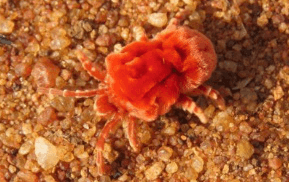 Another favorite was the rain spider (Rooi fluweelmyt / Red Velvet Mite) that crawled out of the sand after we had rain on the farm. They were the most brilliant red color and soft as velvet. It’s as if this bright-colored little spider embodies the promise and excitement of the new life brought about by the rain.
Another favorite was the rain spider (Rooi fluweelmyt / Red Velvet Mite) that crawled out of the sand after we had rain on the farm. They were the most brilliant red color and soft as velvet. It’s as if this bright-colored little spider embodies the promise and excitement of the new life brought about by the rain.
Under German rule Namibia was known as German South West Africa. After the end of German occupation, it was known as South West Africa Südwestafrika in German, and after independence in 1990, it became known as Namibia.
Do I miss Namibia? O yes, very much—every day. And when I miss it too much, I listen to the Südwesterlied which is an old German song which had become something akin to the anthem of Namibia. Listen to it here https://www.youtube.com/watch?v=iniiXfJEwlY
| German | Literal English translation |
| Hart wie Kameldornholz ist unser Land
Und trocken sind seine Riviere. Die Klippen, sie sind von der Sonne verbrannt Und scheu sind im Busch die Tiere. |:Und sollte man uns fragen: Was hält euch denn hier fest? Wir könnten nur sagen: Wir lieben Südwest! 😐 |
Our land is as hard as the wood of the camel thorn tree
And its rivers are dry. The cliffs, they are burned by the sun And the animals are hiding in the bush. |: And should we be asked: What is holding you here? We could only say: We love Southwest! : | |
| Doch unsre Liebe ist teuer bezahlt
Trotz allem, wir lassen dich nicht Weil unsere Sorgen überstrahlt Der Sonne hell leuchtendes Licht. |: Und sollte man uns fragen: Was hält euch denn hier fest? Wir könnten nur sagen: Wir lieben Südwest! 😐 |
But our love is paid at a very high price
Despite of all this, we don’t let you down For our sorrows are outshined by the sun´s glary light |: And should we be asked: What is holding you here? We could only say: We love the southwest! : | |
| Und kommst du selber in unser Land
Und hast seine Weiten gesehen Und hat unsre Sonne ins Herz dir gebrannt Dann kannst du nicht wieder gehen. |: Und sollte man dich fragen: Was hält dich denn hier fest? Du könntest nur sagen: Ich liebe Südwest! 😐 |
And do you come to our country yourself
And have seen its vastness And has our sun burned into your heart Then you won’t be able to go again. |: And should someone ask you: What is holding you here? You could only say: I love Southwest! : | |

Leave a Reply